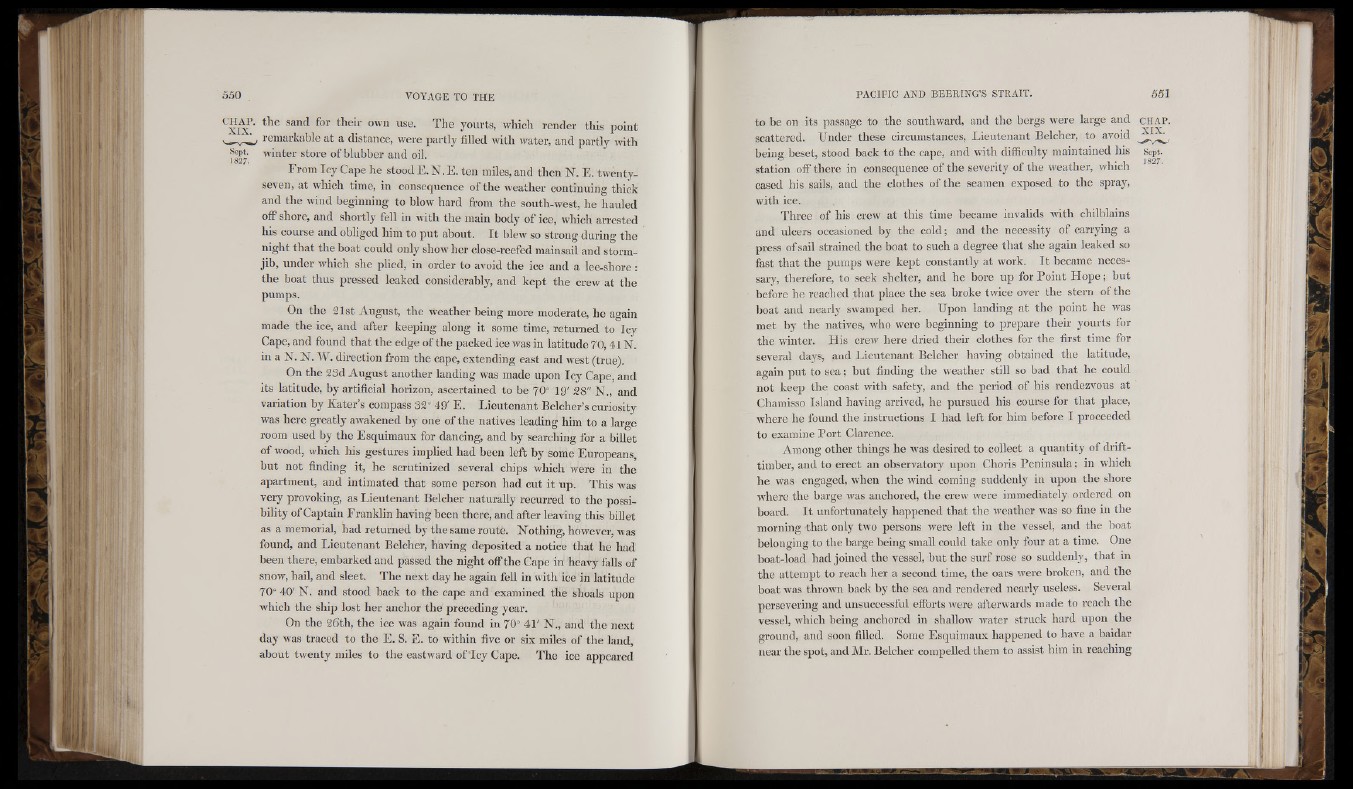
I) j'
m
the sand for their own use. The yourts, wliich render this point
, remarkable at a distance, were partly filled with water, aud partly with
winter store of blubber and oil.
From Icy Cape he stood E. N .E . ten miles, and then N. E. twenty-
seven, at which time, in consequence ofthe weather continuing thick
and the wind beginning to blow hard from the south-west, he hauled
off shore, and shortly fell in with the main body of ice, which arrested
his course and obliged him to put about. It blew so strong during the
night that the boat could only show her close-reefed mainsail and storm-
jib, under which she plied, in order to avoid the ice and a lee-shore;
the boat thus pressed leaked considerably, and kept the crew at the
pumps.
On the 21st August, the weather being more moderate, he again
made the ice, and after keeping along it some time, returned to Icy
Cape, and found that the edge of the packed ice was in latitude 7 0 ,4 1N.
in a N. N. W. direction from the cape, extending east and west (true).
On the 23d August another landing was made upon Icy Cape, and
its latitude, by artificial horizon, ascertained to be 70" 19' 28" N., and
variation by Kater’s compass 32" 49' E. Lieutenant Belcher’s curiosity
was here greatly awakened by one of the natives leading him to a large
room used by the Esquimaux for dancing, and by searching for a billet
of wood, which his gestures implied had been left by some Europeans,
but not finding it, he scrutinized several chips which were in the
apartment, and intimated that some person had cut it up. This was
very provoking, as Lieutenant Belcher naturally recurred to the possibility
of Captain F ranklin having been there, and after leaving this billet
as a memorial, had returned by the same route. Nothing, however, was
found, and Lieutenant Belcher, having deposited a notice that he had
been there, embarked and passed the night offthe Cape in heavy falls of
snow, hail, and sleet. The next day he again fell in with ice in latitude
70° 40' N. and stood back to the cape and examined the shoals upon
which the ship lost her anchor the preceding year.
On the 26th, the ice was again found in 70° 41' N., and the next
day was traced to the E. S. E. to within five or six miles of the land,
about twenty miles to the eastward of Icy Cape. The ice appeared
to be on its passage to the southward, and the bergs were large and
scattered. Under these circumstances. Lieutenant Belcher, to avoid
being beset, stood back to the cape, and with difficulty maintained his
station off there in consecjuence of the severity of tlie weather, which
cased his sails, and the clothes of the seamen e.xposed to the spray,
with ice.
'I’hree of his crew at this time became invalids with chilblains
and ulcers occasioned by the cold; and the necessity of carrying a
press of sail strained the boat to such a degree that she again leaked so
fast that the pumps w ere kept constantly at work. It became necessary,
therefore, to seek shelter, and he bore up for Point H op e ; but
before he reached that place the sea broke twice over the stern ofthe
Ijoat and nearly swamped her. Upon landing at the point he was
met by the natives, who w'ere beginning to prepare their yourts for
the winter. His crew here dried their clothes for the first time for
several days, and Lieutenant Belcher having obtained the latitude,
again put to sea; but finding the weather still so bad that he could
not keep the coast with safety, and the period of his rendezvous at
Chamisso Island having arrived, he pursued his course for that place,
where he found the instructions I had left for him before I proceeded
to examine Port Clarence.
Among other things he was desired to collect a quantity of drift-
timber, and to erect an observatory upon Choris Peninsula; in which
he was engaged, when the wind coming suddenly in upon the shore
where the barge was anchored, the crew' were immediately ordered on
board. It unfortunately happened that the weather was so fine in the
morning that only two persons w'ere left in the vessel, and the boat
belonging to the barge being small could take only four at a time. One
boat-load had joined the vessel, but the surf rose so suddenly, that in
the attempt to reach her a second time, the oars were broken, and the
boat was thrown back by the sea and rendered nearly useless. Several
persevering and unsuccessful efforts were afterw'ards made to reach the
vessel, W'hich being anchored in shallow' w'ater struck hard upon the
ground, and soon filled. Some Esquimaux happened to have a baidar
near the spot, and Mr. Belcher compelled them to assist him in reaching
C H A P .
X IX .
Sept.
1827.